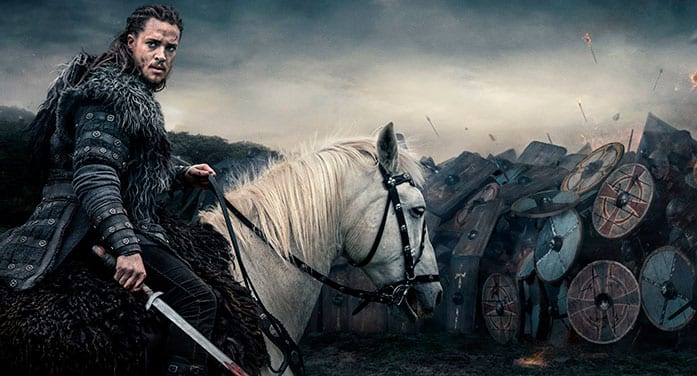Reading Time: 3 minutes
 An electrician in to do some wiring work a couple of months ago ran his eye over the media shelf, noticed the Vikings DVD set and announced that The Last Kingdom was better. So in the midst of a pandemic winter, we tracked down the extant four seasons and gave it a whirl.
An electrician in to do some wiring work a couple of months ago ran his eye over the media shelf, noticed the Vikings DVD set and announced that The Last Kingdom was better. So in the midst of a pandemic winter, we tracked down the extant four seasons and gave it a whirl.
The series timeline starts in the mid-ninth century and is built around the ongoing conflict between Saxon and Dane for control of England. Many historical figures and events are included, although the main character – Uhtred of Bebbanburg– is fictional.
The narrative source is The Saxon Stories, a series of 13 medieval novels by Bernard Cornwell, an author who has produced over 60 books since beginning in 1981 with the Napoleonic-era adventures of a fictional English rifleman called Richard Sharpe. Productivity on that scale is almost intimidating.
Productions like The Last Kingdom mainly function as entertainment. But they also help fill a gap in popular understanding of the past.
Until relatively recently, a casual observer could be forgiven for thinking that English history more or less began with the 1066 Norman Conquest. Popular culture was awash with tales of Robin Hood, Richard the Lionheart and such. Apart from mythical stories of Arthur’s Camelot, pre-Conquest England rarely featured as anything other than a backdrop.
That’s changed. And it’s a change to be applauded.
Saying so isn’t meant to downplay the historical significance of 1066 and its aftermath.
To quote historian Robert Tombs’ assessment of the Norman Conquest: “A new warrior class – at first about 8,000 men – annihilated the Anglo-Saxon nobility and almost monopolized power and wealth.” The impact spilled over into language, literature and architecture, in addition to changing England’s external orientation from Scandinavia to France.
Nor is there any suggestion of the post-Conquest arrangement being illegitimate.
Yes, the Normans came to England as invaders. But so too did the Saxons and the other Germanic tribes that arrived several centuries earlier. It was the way the world worked.
What was pre-Conquest England like?
By the early 800s, the West Saxons had become the most important power. Their base was in the kingdom of Wessex, situated in the south of the country with Winchester as its capital.
Then a new force arrived, first as sea-borne raiders and subsequently as outright invaders. Although The Last Kingdom refers to them as Danes, their origins included Norway and Sweden. They’re more generally known as Vikings.
The first recorded Viking touchdown was a 793 raid on the monastery of Lindisfarne off England’s north-east coast. By the mid-800s, their ambitions had expanded to seizing total control of whatever was there to be grabbed.
Alfred, later known as Alfred the Great, is the first major historical figure featured in The Last Kingdom. On assuming the kingship of Wessex in 871, he set out to contain/push back the invaders while also promoting the idea of a united English kingdom. Naturally, the House of Wessex would sit at the summit.
Modern historians give Alfred a good press. Along with his military capabilities, he’s seen as a scholarly man in a generally illiterate age, a skilled lawgiver and a builder of institutions. It’s even suggested that he invented the concept of an English nation.
The Last Kingdom, though, takes a somewhat more jaundiced view.
The show’s portrayal of Alfred does acknowledge the characteristics posited by historians. It also depicts him as a morally vain, self-righteous prig who often just got lucky on the military front. In large measure, his triumphs over the Vikings are ascribed to the advice and actions of the series’ fictional hero, Uhtred, whom Alfred often treats badly.
We’re also introduced to Alfred’s son and successor, Edward, who reigned for 25 years and significantly extended his father’s efforts to establish a united English kingship under Wessex control. But in the series so far, Edward’s reign is in its early days and what we see is an inexperienced, petulant king who is seriously out of his depth.
The Last Kingdom isn’t a scrupulously accurate historical documentary. Still, it’s quite engrossing as a viewing spectacle, even if this septuagenarian could’ve done with significantly fewer battle scenes.
And it isn’t over yet. Only eight of the 13 books have been addressed to-date, so there’ll be at least one more season.
Troy Media columnist Pat Murphy casts a history buff’s eye at the goings-on in our world. Never cynical – well, perhaps a little bit. For interview requests, click here.
The opinions expressed by our columnists and contributors are theirs alone and do not inherently or expressly reflect the views of our publication.
© Troy Media
Troy Media is an editorial content provider to media outlets and its own hosted community news outlets across Canada.

